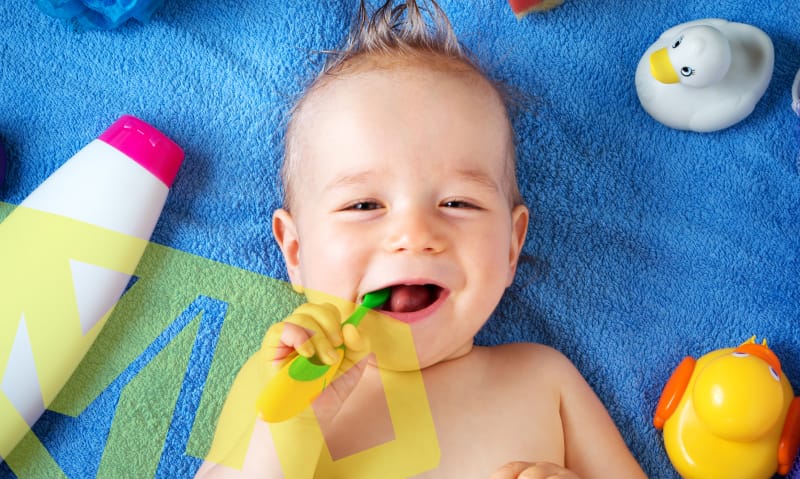8 Tips for Promoting Good Oral Health from Babyhood

How to Help Your Child Develop a Healthy Smile
Every parent wants their child to have a healthy, beautiful smile that lasts through to their teenage years and beyond. You can help your child achieve this level of optimal oral health by prioritizing dental care from babyhood, even before they get their first baby teeth.
Here are eight top tips for parents who want to do the most they can to ensure a cavity-free smile for their infant, toddler, or child.
1. Get your baby accustomed to future dental care by cleaning their gums with a clean, damp cloth after meals.
Infants’ oral health can benefit from a daily oral hygiene routine even before they get their first baby teeth. Keeping the gums clean is not only soothing, but it helps your baby get used to the feel of dental care before a toothbrush is even introduced. After feedings or snacks, dampen a clean, soft cloth (microfiber is great!) with warm water and use your finger to guide this rag gently over your baby’s gums.
2. Start brushing with a soft-bristled infant toothbrush as soon as the first baby tooth erupts.
Once your baby’s first tooth does come in you can introduce an infant toothbrush or a children’s toothbrush with ultra-soft bristles. At first you can simply wet the toothbrush, but the AAPD does recommend using fluoride toothpaste for early cavity prevention. For an infant with only a few teeth, a rice grain-sized smear of children’s toothpaste is all that’s necessary.
3. Schedule your baby’s first visit to the dentist no later than their first birthday.
Within six months of the first baby tooth erupting and no later than their first birthday, your baby is ready for a trip to a pediatric dentist. The first few trips to the dentist may seem uneventful as your baby only has a few teeth, but rest assured that these early visits are highly recommended for a reason. They help your baby develop trust with their dentist and the dental care team, and they give your baby a chance to get used to the environment before any actual treatment appointments.
4. Use a pea-sized amount of kids’ toothpaste and teach your child to always spit after brushing.
As more baby teeth erupt you can begin to use more fluoride toothpaste. Typically, by age three your toddler will be ready for a pea-size amount of toothpaste that’s approved for use in children of this age range. It can take a while for kids to learn how to spit out toothpaste and resist the reflexive urge to swallow it instead. Help your child develop this habit by teaching them how to spit as early as possible.
5. Encourage your child to drink water throughout the day and limit cavity-provoking beverages, like juice.
Staying hydrated is vital for oral health and overall health. Make sure your child drinks fresh water throughout the day and provides water during meals rather than sports drinks, soda, or juice. Speaking of juice, be mindful of how much juice your child consumes. Juice can be just as bad as soda for your child’s teeth due to its high sugar content.
6. Provide your child with a nutritious, varied diet from the very start and keep an eye on sugar consumption.
Crunchy raw vegetables and fruits, lean protein, and dairy products are all smile-friendly foods to introduce to your child, as deemed appropriate by their age. Keep things interesting by changing up the types of foods you offer to help prevent any picky eating. As far as pre-packaged snacks and foods go, check nutrition labels for hidden sugars.
7. Continue taking your child in for dental check-ups and cleanings every six months.
Starting from their very first visit as a baby, most kids should continue seeing their pediatric dentist every six months. In some cases a dentist may even recommend more frequent visits, especially if your child is at high risk for cavities or plaque build-up. These preventive care visits give the dentist a chance to monitor development and catch any early signs of oral health trouble before they become a big problem. Cleanings also remove plaque that brushing and flossing can’t.
8. Invest in preventive dental care services, such as dental sealants and topical fluoride treatments.
Preventing cavities is one of the most important steps in helping your child maintain good oral health. In addition to regular check-ups and cleanings, you can also elect for additional treatment services for your child. We highly recommend opting-in for topical fluoride treatments after cleanings and having dental sealants placed on your child’s molars. Dental sealants alone can prevent 80% of cavities on the molars for the first two years.
Make Must Love Kids Pediatric Dentistry your child’s dental home!
Establishing a permanent dental home is one of the best things you can do for your child’s present and future oral health.
By visiting the same pediatric dentistry practice over a period of years, your child will be able to foster a solid, trusting relationship with their dentist. As a parent, remembering to maintain regular six-month visits is also a breeze since your child’s dental care team will remind you of upcoming appointments.
Many families in the Vancouver, WA, area have chosen Must Love Kids as their children’s dental home because of our expertise and gentle approach to working with kids of all ages and abilities. Schedule an appointment for your child today by calling our office or requesting a visit online.